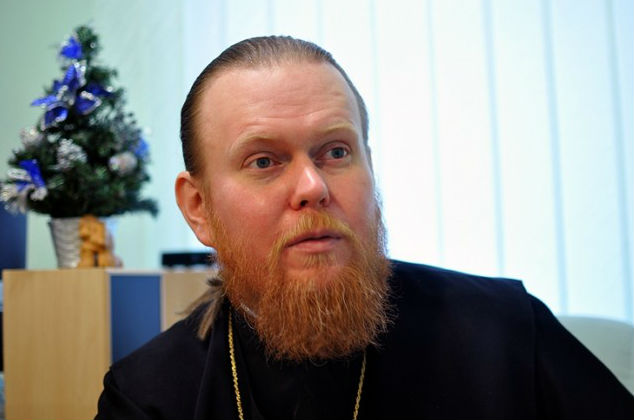![Archbishop Zoria Yevstratiy of Chernihiv of the Ukrainian Orthodox Church's Kyiv Patriarchate said that the war in Ukraine isn’t a civil war in an interview on May 19. “The main conflict is between modern Ukraine and Ukraine as a Soviet state,” he said. “The Soviet past is trying to reestablish itself as [a] new empire.” Creative Commons/cpod.co](http://www.atlanticcouncil.org/wp-content/uploads/2015/05/20150521WarUkraineGlobalSignificance.jpg) “To those from outside, [the fighting in Ukraine] may seem like a regional conflict, but that’s really not the case,” said Archbishop Zoria Yevstratiy of Chernihiv of the Ukrainian Orthodox Church’s Kyiv Patriarchate.
“To those from outside, [the fighting in Ukraine] may seem like a regional conflict, but that’s really not the case,” said Archbishop Zoria Yevstratiy of Chernihiv of the Ukrainian Orthodox Church’s Kyiv Patriarchate.
In an interview at the Atlantic Council on May 19, Yevstratiy described the situation in Ukraine as unique and of global significance.
“It’s the first time since World War II that war is being used as an instrument of politics in Europe,” he said. Russia, a “key global state, is again using war to resolve conflict.”
The Archbishop said Russian President Vladimir Putin has used a combination of war and lies to advance his interests. “When Putin lies, he knows he’s lying, he knows that Western leaders know he’s lying, and he has no shame. He doesn’t even conceal that he’s lying. For example, in Crimea, he insisted that there were no Russian troops in Crimea,” he said.
He thinks Putin will continue until he’s stopped.
As Yevstratiy sees it, Putin presents Russia as a mediator, not an aggressor, in the conflict in Ukraine.
“What does Putin want? Putin wants to win the Cold War that was lost by [former General Secretary of the USSR, Mikhail] Gorbachev.” Putin wants the West to recognize that the Kremlin has a sphere of interest in which it isn’t allowed to interfere, he said. “Putin sees himself as the new [Joseph] Stalin in international relations.”
And Ukraine is vulnerable since it gave up its nuclear arsenal twenty years ago in exchange for security guarantees from Russia and the West, he added.
Fruitful cooperation among religions except Moscow Patriarch
Fifteen years ago, seventeen denominations formed the All-Ukrainian Council of Churches and Religious Organizations. The Council includes representatives from the Jewish, Orthodox, Roman Catholic, Baptist, Lutheran, Muslim, and other communities. It is a rare positive example of post-Soviet interreligious dialogue, a sign “that we can cooperate and have a common message,” Yevstratiy said.
In October 2013, the Council supported Ukraine’s integration with the European Union. During the Euromaidan protests, it tried to defuse the conflict, calling for dialogue between the government and the protestors, and offering to mediate. Viktor Yanukovych’s government rejected the offer. In March 2014, as Russia annexed Crimea, the Council rejected separatist movements.
The Council delivers food, clothing, and financial help to internally displaced persons through chaplains and churches on the frontline.
“Right now there’s a huge need for more humanitarian assistance,” Yevstratiy said.
While Yevstratiy hasn’t been to the frontlines, he’s in touch with other chaplains who have.
Chaplains tell soldiers that death is not the most important thing; their duty is to live a moral life.
“We tell them, ‘If we want to be a free country and a free society, we have to pay for this,'” said Yevstratiy.
The Archbishop was quick to point out that the war in Ukraine isn’t a civil war. “The main conflict is between modern Ukraine and Ukraine as a Soviet state,” he said. “The Soviet past is trying to reestablish itself as [a] new empire.”
Yevstratiy said Putin wants complete control over Ukraine, including political, military and economic control, for two reasons. First, the Russian mindset assumes that Ukraine is part of Russia. Second, Putin is afraid of the example a democratic Ukraine would set for Russians.
“If democracy is successful in Ukraine, this means we can have democracy in Russia,” which is absolutely unacceptable to Putin, the Archbishop said.
The Archbishop spoke about the importance of Radio Free Europe/Radio Liberty and Voice of America during the Cold War. “One of the biggest mistakes of the West was completely depleting their resources” after the end of the Cold War, he said. The BBC’s Ukraine service is only available online. In contrast, Russia has heavily invested in spreading its message in the West and Eastern Europe through RT and Sputnik.
“Russian propaganda is becoming a European problem as well,” Yevstratiy said.
Recognition of Kyiv Patriarchate by Constantinople
The Orthodox Church in Ukraine is divided. Of the 70 percent of Ukrainians who identify as Orthodox, 44 percent are loyal to the Kyiv patriarch, 20 percent to the Moscow patriarch, and 6 percent are not affiliated but consider themselves Orthodox.
In the past year, the Kyiv Patriarchate has grown by more than 10 percent, from 33 to 44 percent.
Yevstratiy is quick to point out that “[w]e don’t want current divisions to remain. We want a united church.”
“Unity is our only way forward,” he added.
The Constantinople patriarch has the power to recognize the Kyiv patriarchate as a united church. The West has leverage because the Constantinople patriarch is the spiritual leader of the Orthodox diaspora in Europe and the United States.
Yevstratiy wouldn’t speculate as to when the Constantinople patriarch might recognize the Kyiv patriarchate, but he indicated that discussions were underway.
Melinda Haring is editor of UkraineAlert.
Image: Archbishop Zoria Yevstratiy of Chernihiv of the Ukrainian Orthodox Church's Kyiv Patriarchate said that the war in Ukraine isn’t a civil war in an interview on May 19. “The main conflict is between modern Ukraine and Ukraine as a Soviet state,” he said. “The Soviet past is trying to reestablish itself as [a] new empire.” Creative Commons/cpod.co

